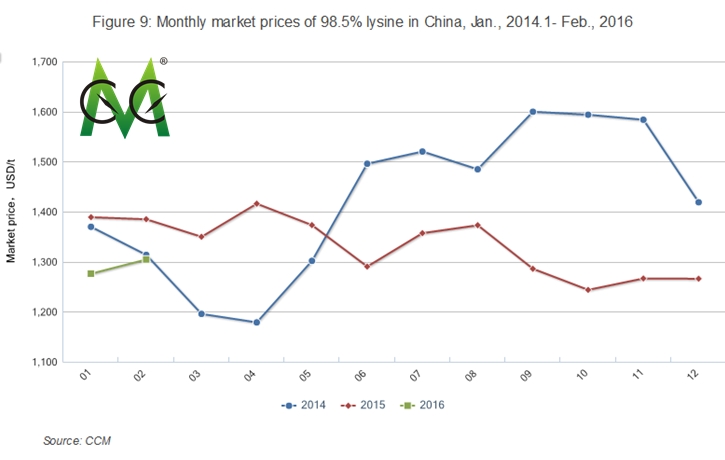Chinese lysine prices rose abnormally after the Spring Festival. However, CCM is
of the opinion that this increase isn't going to be enormous and it's likely
that the price will sink back down later, considering the price and supply
situation of its raw material, corn.

Lysine transactions
gradually returned to normal after the Spring Festival, but most enterprises
decided to suddenly raise the prices of their products, which surprised their
downstream customers.
Currently,
in Feb., 2016, the market price of lysine is USD1,304.56 /t (RMB8,550 /t), up
by 3.02% MoM, according to CCM research.
Although the increase
wasn't great, the price increase was unexpected. Firstly, there usually isn't a
huge demand for lysine after the Spring Festival, which is usually off-season
for the livestock breeding industry. The average price of lysine over the past
four years was lower than that in Jan. 2016.
Secondly, there is no
reason for an increase from the perspective of the downstream market.
Live pigs:
Pig stock levels
decreased over the month, as most farmers had actively sold off their live pigs
before the Spring Festival, a festival which drives the demand and price of
live pigs. As a consequence, demand for lysine from the live pig breeding
industry is lower in Feb. than it was in Jan.
In Jan., the domestic
stock of live pigs and adult sows declined, according to the Ministry of
Agriculture of China.
-
Live pig stock: 373.43 million heads, dropped by 2.7% MoM
-
Adult sow stock: 37.83 million heads, dropped by 0.4% MoM

Chicken:
After the Spring
Festival, the price of eggs dropped, and continued to do so, even approaching
USD0.91/Kg (RMB6/Kg), which has discouraged farmers. In addition to this, the
price of baby chicks was as high as USD0.53/head (RMB3.45/head) on average. For
these reasons, farmers were unwilling to add additional chicks to their farms.
This general situation is unfavorable for the future development of lysine
industry.
There were two main
reasons for the unexpected increase in the price of lysine, according to CCM
research.
On the one hand, after
the Spring Festival, the operating rate of lysine enterprises was low, which
limited the supply of lysine. In Dec., 2015, COFCO Biochemical (AnHui) Co.,
Ltd. began the relocation of its factory, a response to the environmental protection
policy "moving out of cities and into industrial parks", and the
company still hasn't resumed production yet. Additionally, Xijie (Liaocheng)
Biotechnological Co., Ltd. began to suspend production before the Spring
Festival, and has yet to resume.
On the other hand, after
the Spring Festival, some European users began to stock up on lysine for Q2
2016, leading to increasing demand for Chinese lysine, which then resulted in
tight supply.
In Jan., the export
volume of the two main Chinese lysine varieties, lysine ester and lysine salt,
was 21,037 tonnes, up by 5.23% MoM, according to China Customs.
The price of lysine
won't increase greatly, and is likely to sink back down later, according to
CCM.
Firstly, the tight
supply will be alleviated, as more and more enterprises resume production and
increase their supply.
Secondly, the price of
corn is likely to continue to decrease, due to a reduction of government
interference in it. The decreasing price of corn, lysine's raw material, makes
it unable to support a rise in the price of lysine.

About CCM:
CCM is the leading
market intelligence provider for China’s agriculture, chemicals, food &
ingredients and life science markets. Founded in 2001, CCM offers a range of
data and content solutions, from price and trade data to industry newsletters
and customized market research reports. Our clients include Monsanto, DuPont,
Shell, Bayer, and Syngenta. CCM is a brand of Kcomber Inc.
For more information
about CCM, please visit www.cnchemicals.com or
get in touch with us directly by emailingecontact@cnchemicals.com or
calling +86-20-37616606.
Tag: lysine